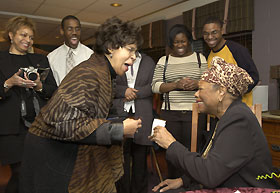|
This is an archived article. For the latest news, go to the Advance Homepage
For more archives, go to the Advance Archive/Search Page. |
||
|
Maya Angelou Encourages Students
On a cold winter night, the subject was rainbows. Poet, novelist, and educator Maya Angelou captivated the audience at the Jorgensen Center for the Performing Arts on Thursday with an hour of anecdotes and encouragement directed to UConn students.
She began with a song, "When it look like the sun was not shining anymore, God put a rainbow in the sky," and repeated the refrain amid verses from a poem, later changing "sky" to "clouds." The words, she said, are rooted in the Book of Genesis and the great flood. "Some people just want to get that paper," she said to the students, alluding to a college degree. "Get married, have a three-bedroom home, two-car garage, two-and-a-half children. "That's not why you are here. Your charge is onerous and at the same time honorable. You are here to make this country more than it is today," she said. "I'm supposed to talk about my accomplishments. No way," the 75-year-old Angelou said to gales of laughter. "I want to talk about your accomplishments. You can be rainbows in the clouds, each one of you." She then began a narrative of her own life with the words, "Let me tell you about some of my rainbows." After her parents divorced when she was three and her brother five, her mother sent them from Los Angeles to live with grandparents who were shopkeepers in Stamps, Ark., a village "about the size of this stage," she said. She spoke of her grandfather, Uncle Willie, who was partially paralyzed, and how he taught her the times tables, and how she and her brother hid him in a vegetable bin when "the boys would ride in front of our store," referring to the Ku Klux Klan. Years later, when Willie died, Angelou stopped in Little Rock on her way to the funeral in Stamps. She was surprised to be met by a number of city leaders who spoke fondly of her grandfather. "'In 1920,' said one, 'I was the only child of a blind mother. Willie gave me a job, made me love to learn. Because of him, I went to school, and now I'm the mayor of Little Rock,'" recounted Angelou. "A crippled, poor black man," Angelou said of Willie. "Who could have imagined the breadth that his light revealed? "To be an American is a hard duty. It's also a great duty," she said. "A lot has been done. A lot remains to be done. É Learn about being a human being. Set down the burden you have been carrying, the burden of ignorance. "We need you desperately," she told the students. "You are the best we have." When Angelou was seven, she went back to live with her mother in St. Louis, and was raped by her mother's boyfriend. The man was arrested, freed, and later found murdered. "I was so traumatized that I stopped speaking," she said. "I thought my voice killed him." The incident is detailed in her autobiographical book, I Know Why the Caged Bird Sings. She was then sent back to Stamps, and poignantly recalled how her grandmother, whom she called "Mama," would comfort and encourage her by predicting she would become a teacher. "I am a Chubb Fellow at Yale," Angelou said. "I have 55 doctorates and speak a number of foreign languages. I say this not to brag but to tell you the power of a rainbow in the clouds. Mama changed me from a mute to what you see today, somebody who hardly stops talking" - or achieving. Angelou has authored 11 books, served on presidential commissions, read a poem at the January 1993 inauguration of Bill Clinton, and has written, produced, directed, and acted in productions for the stage, film, and television. She also has a lifetime appointment as Reynolds Professor of American Studies at Wake Forest University in Winston-Salem, N.C., where she lives. "My encouragement to you," she said to the students in conclusion, "is that life is our most precious gift. Let us live so well that we will not regret. "We can be, and must be, rainbows in the clouds," she said. The presentation, which began with a standing ovation, closed with similar applause. "I loved it," said sophomore Dione Thomas, who said she wants to be a teacher. "She really inspired me to find my rainbow." "An Evening with Dr. Maya Angelou" was sponsored by the SUBOG Lecture Committee, the African-American Cultural Center, the Institute for African-American Studies, the Division of Multicultural Affairs, and the Jorgensen Center for the Performing Arts. |

